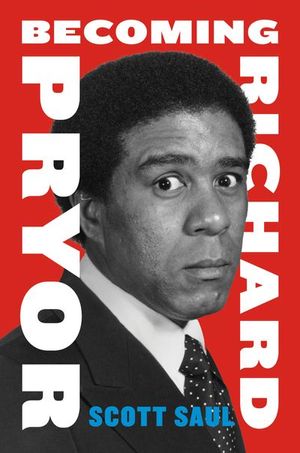Becoming Richard Pryor
An intimate biography with photographs included: “The most detailed and rigorously researched work on the comic’s life and performances.” —The Washington Post
Richard Pryor may have been the most unlikely star in Hollywood history. Raised in his family’s brothels, he grew up an outsider to privilege. He took to the stage, originally, to escape the hard-bitten realities of his childhood, but later came to a reverberating discovery: that by plunging into the depths of his experience, he could make stand-up comedy as exhilarating and harrowing as the life he’d known. He brought that trembling vitality to Hollywood, where his movie career—Blazing Saddles, the buddy comedies with Gene Wilder, Blue Collar—flowed directly out of his spirit of creative improvisation. The major studios considered him dangerous. Audiences felt plugged directly into the socket of life.
Becoming Richard Pryor brings the man and his comic genius into focus as never before. Drawing upon a mountain of original research—interviews with family and friends, court transcripts, unpublished journals, screenplay drafts—Scott Saul traces Pryor’s rough journey to the heights of fame: from his heartbreaking childhood, his trials in the army, and his apprentice days in Greenwich Village to his soul-searching interlude in Berkeley and his ascent in the “New Hollywood” of the 1970s.
Illuminating an entertainer who, by bringing together the spirits of the black freedom movement and the counterculture, forever altered the DNA of American comedy, it reveals that, while Pryor made himself a legend with his own account of his life onstage, the full truth of that life is more bracing still.
“Absorbing, incisive . . . .With skill and insight, Saul shows how both the best and the worst of Pryor could merge into a great body of work unmatched by anyone who was ever paid to make people laugh.”—USA Today
“A pop-culture masterpiece of exhaustive reporting, psychological insight and elegant writing.”—Cleveland Plain Dealer
“Shines a light on a revolutionary stand-up comic who perfected the art of dramatizing his own imperfections, and the world’s.”—Publishers Weekly
Richard Pryor may have been the most unlikely star in Hollywood history. Raised in his family’s brothels, he grew up an outsider to privilege. He took to the stage, originally, to escape the hard-bitten realities of his childhood, but later came to a reverberating discovery: that by plunging into the depths of his experience, he could make stand-up comedy as exhilarating and harrowing as the life he’d known. He brought that trembling vitality to Hollywood, where his movie career—Blazing Saddles, the buddy comedies with Gene Wilder, Blue Collar—flowed directly out of his spirit of creative improvisation. The major studios considered him dangerous. Audiences felt plugged directly into the socket of life.
Becoming Richard Pryor brings the man and his comic genius into focus as never before. Drawing upon a mountain of original research—interviews with family and friends, court transcripts, unpublished journals, screenplay drafts—Scott Saul traces Pryor’s rough journey to the heights of fame: from his heartbreaking childhood, his trials in the army, and his apprentice days in Greenwich Village to his soul-searching interlude in Berkeley and his ascent in the “New Hollywood” of the 1970s.
Illuminating an entertainer who, by bringing together the spirits of the black freedom movement and the counterculture, forever altered the DNA of American comedy, it reveals that, while Pryor made himself a legend with his own account of his life onstage, the full truth of that life is more bracing still.
“Absorbing, incisive . . . .With skill and insight, Saul shows how both the best and the worst of Pryor could merge into a great body of work unmatched by anyone who was ever paid to make people laugh.”—USA Today
“A pop-culture masterpiece of exhaustive reporting, psychological insight and elegant writing.”—Cleveland Plain Dealer
“Shines a light on a revolutionary stand-up comic who perfected the art of dramatizing his own imperfections, and the world’s.”—Publishers Weekly
BUY NOW FROM
COMMUNITY REVIEWS

